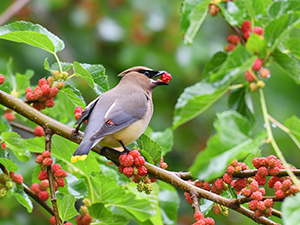The Impact of Birds on Soft Fruit Crops: Challenges & Solutions
Jun 18, 2024
Over the course of the summer, soft fruits such as wine grapes, strawberries, blueberries, raspberries and cherries ripen and mature. Unfortunately, during this pivotal moment for farmers and growers, fruit crops are particularly vulnerable to bird damage.
Birds, including starlings, robins, blackbirds, grackles, sparrows, crows and ravens, are naturally attracted to soft fruits due to their sweetness and high nutritional value. This blog will explore the impact birds have on soft fruit production, the challenges they pose, and solutions to mitigate these issues.
Economic Consequences
Annually, birds cost farmers and growers hundreds of millions of dollars in revenue due to crop damage and loss. The extensive damage they cause leads to both direct and indirect losses.
Direct losses occur when birds consume or peck at the fruit, rendering it unsellable. Indirect losses can arise from diseases introduced by birds, such as fungal infections that enter through peck wounds. Combined, these losses can translate into significant financial setbacks for farmers and growers.
Challenges in Managing Bird Damage
Managing bird damage in soft fruit production presents several challenges related to:
Bird Behavior
Birds are intelligent and can quickly adapt to deterrents. They may also become habituated to scare tactics, rendering them ineffective over time.
Legislation
All bird species – except for pigeons, starlings and sparrows – are protected by the federal government under the Migratory Bird Treaty Act, and some states have implemented additional protections. As such, it is imperative that your property conducts work in accordance with applicable federal and state regulations to avoid non-compliance.
Environmental Impact
The use of chemical repellents can harm the environment and non-target species, making it an undesirable option for many growers.
Economic Feasibility
Some bird deterrent methods can be expensive, particularly for small-scale farmers. The cost of implementing and maintaining these measures needs to be weighed against the potential losses.
Solutions to Mitigate Bird Damage
Despite these challenges, there are several strategies that can help reduce bird damage to soft fruit crops. It is important to consider the bird species affecting your crop, the crop type itself, as well as the surrounding environment when designing an appropriate management strategy. Below are our top five solutions to mitigate bird damage to your soft fruit:
Automated Lasers
An automated laser system can cover large areas and provide consistent yet varied deterrence. This strategy helps mitigate bird habituation, requires little ongoing maintenance, and does not harm the soft fruit.
Netting
Covering fruit crops with bird netting is one of the oldest bird control methods. Netting creates a physical barrier that prevents birds from accessing the fruit. However, it can be labor-intensive to install and maintain and may even damage the crop itself.
Habitat Modification
Reducing the attractiveness of the area to birds by removing nearby roosting and nesting sites can help deter them. This may involve trimming trees or installing other, physical deterrents to prevent perching.
Chemical Repellents
While less desirable due to product and environmental concerns, some growers use chemical repellents that make the fruit taste unpleasant to birds. These should be used with caution and in accordance with state and local regulations.
Scare Tactics
Visual and auditory scare devices, such as reflective tape, scarecrows, and bird distress calls, can be used to deter birds. However, these methods are more effective when regularly moved to prevent birds from becoming accustomed to them.
Your Partner in Soft Fruit Production Protection
While birds can continue to present a challenge for soft fruit growers, the appropriate combination of strategies can significantly reduce the impact of bird damage to crops. By understanding the behaviors and patterns of specific bird species, farmers and growers can implement site-specific solutions that protect their valuable crops to realize a fruitful (pun intended) harvest.
For more information about how to guard your crops against nuisance birds, contact Wild Goose Chase’s team of biologist and environmental scientists.




 0
0
